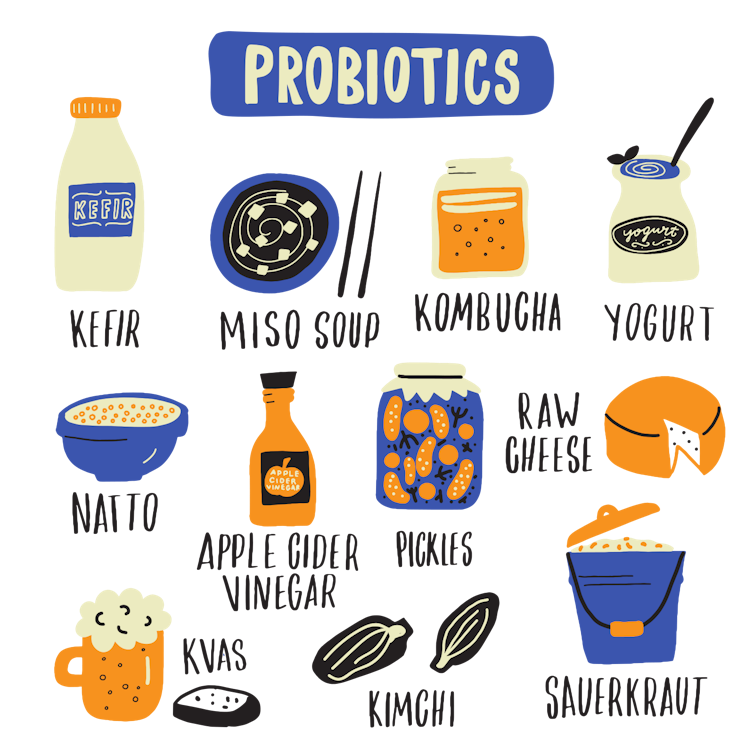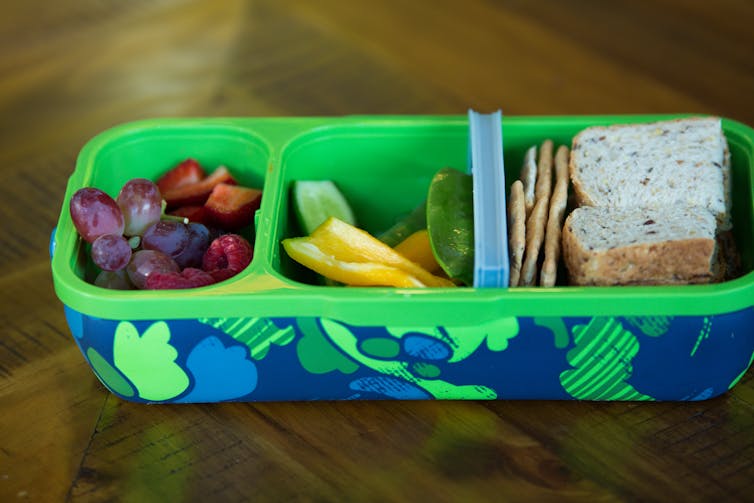Source: The Conversation (Au and NZ) – By Christopher Mayes, Senior Research Fellow, Alfred Deakin Institute, Deakin University

Shutterstock
Does your child have a “gut-friendly” lunchbox? It’s Healthy Lunchbox Week, a back-to-school initiative of Nutrition Australia. School lunches are essential for long-term child health and well-being, according to some researchers.
There are even media reports that a “gut-friendly” lunchbox might help protest us against COVID-19.
Many products are now heavily marketed as promoting gut health. How can parents, carers and schools navigate these claims in deciding what children should eat?
What is a gut-friendly lunch?
In recent years, microbiome scientists and nutritionists have drawn attention to the interaction between our diet, the colony of microbes in our gut (microbiota), and our health. We have moved beyond the simple idea of nutrition and health as “energy in, energy out”. Instead, human-gut microbiome research understands our bodies as members of and hosts to multispecies communities.
A gut-friendly diet consists of foods that build healthy microbiota. Foods with “friendly” or “good” bacteria – yoghurt, kimchi, sourdough and kombucha, for example – are claimed to promote the microbiota colony in our gut, thereby improving overall health.
Excitement surrounding this research is based upon the hope that your gut microbiome might hold the key for countering a range of diseases and conditions. The benefits include better heart health, lower risks of diabetes and obesity, and decreases in depression and anxiety. Some also claim healthy gut microbiota could help fight COVID and other infectious diseases by boosting the immune system.
Read more:
Essays on health: microbes aren’t the enemy, they’re a big part of who we are
Against this backdrop, it’s little surprise the school lunchbox has again been targeted as one way to help solve today’s public health challenges.
The ‘gutification’ of food and diets
Much of the research on microbiomics is in its early stages. There are gaps in scientific knowledge in this field. Still, the focus on the gut and its relation to human health is changing our understanding of food, health and our bodies.
Food corporations have arguably been among the biggest drivers of the gutification of foods. More and more products are labelled using the language and concepts of “gut health”, “mood food” and “immunity boosting”. Yoghurts for children, for example, are marketed using terms such as “probiotics”, “immune boosting” and “strengthening”.
Manufacturers’ marketing is part of a broader trend of using nutrition science in “wellness” industries.
However, some researchers are cautious about the specific health claims made by food corporations. Others have raised concerns that the general advice to consume probiotics could harm some individuals, such as those with an overactive immune system.
The Therapeutic Goods Administration does regulate products like, for example, fecal microbiota transplants. But food-related claims about gut microbiota and health are under-regulated. These products often fall between the cracks of medicine and food regulation and labelling requirements.

Shutterstock
Read more:
Boosting your ‘gut health’ sounds great. But this wellness trend is vague and often misunderstood
Is the ‘immunity-boosting’ lunchbox ethical?
The concern about these products is not just a matter of scientific evidence. In the race to commercialise such products (as with other new food technologies including nano- and biotechnology), the social and ethical dimensions of this burgeoning industry have been neglected.
Industry sees the process of properly considering such questions as slowing down innovation. But it’s vital to answer these social and ethical questions to ensure community expectations and standards related to food science and innovation are upheld.
In these times of heightened anxiety about child health at school, gut-healthy products can give parents and carers a greater sense of control over their child’s health. Yet almost all of the conditions or diseases gut-healthy foods purport to address have complex causes located in a myriad of structural factors. Public health researchers call these the social determinants of health.
Obesity, heart disease and depression are all complex conditions. They are shaped by family history, environment, geography, genetics, economics and education. These factors are beyond the responsibility of individuals and can’t simply be solved by more probiotics.

Shutterstock
Read more:
Let’s untangle the murky politics around kids and food (and ditch the guilt)
A major concern within public health ethics is when individuals are made responsible for social or structural problems. It’s like blaming an individual for not using an energy-saving light bulb while the government is supporting new coal mines. Similarly, expecting a school lunchbox to protect a child from diseases doesn’t make up for inadequate public health infrastructure.
This situation risks putting the responsibility for managing a global pandemic on individual carers (as well as requiring parents and carers to navigate science claims). It also sends a confusing message to the community about the nature of infectious disease transmission and prevention. In the absence of widespread vaccination, ventilation, masks and social distancing, “boosted” immunity is not going to protect children or the community.
The gut microbiome is an exciting new area of research. It opens up wide-ranging possibilities for individual and public health. But uncritical acceptance of health claims that over-promise only serves business interests and risks undermining the integrity of the science and overburdening individuals.
As this field develops, the ethical and social dimensions of human-gut microbiome research cannot be left behind.
![]()
Kristen Lyons is a member of the Australian Greens, and senior research fellow with the Oakland Institute.
Christopher Mayes and Deana Leahy do not work for, consult, own shares in or receive funding from any company or organisation that would benefit from this article, and have disclosed no relevant affiliations beyond their academic appointment.
– ref. A gutful of lunchbox hype – has selling ‘good bugs not drugs’ for kids’ health gone too far? – https://theconversation.com/a-gutful-of-lunchbox-hype-has-selling-good-bugs-not-drugs-for-kids-health-gone-too-far-176251




